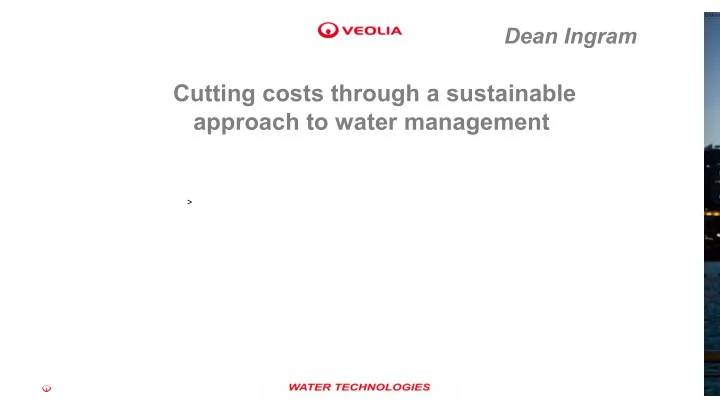

Click ico Dean Ingram Cutting costs through a sustainable approach to water management >
Waste Energy Waste Energy Water Water
Veolia Water Technologies UK Utility water Process Service Laboratory Waste water Boiler feed water water Mobile technology Cooling Solutions systems towers Chemicals
The water issue share your experiences today #BevExpo2016
Top 5 impact risks 5 Source: World Economic Forum, Global Risks Report 2016
Water stress in the UK 6
The water issue Companies are realising water related risks could limit future growth. The importance of water is often undervalued. We must all reconsider our current relationship with this limited resource.
Water stress in the UK Average litres of water used per litre of product Wine 3.29 Brewing 5.00 Soft drinks 2.70 Water is a key ingredient for your product and supply chain 8
Why a sustainable approach? Compliance Water Scarcity and Safety • Water abstraction limits • Competition over abstraction • Discharge limits • Climate threats • No discharge possible • Irregular quality • Accidental contaminations Costs Production needs • Water consumption costs • Increase of production • Discharge fees • Continuous and safe water supply • Need for large volumes • Avoid production shutdown Image • Environmental guidelines • Shareholders expectations • Public opinion and corporate image • Sustainable development 9
Opportunity to treat and reuse water share your experiences today #BevExpo2016
Step 1 – cost reduction opportunities Alternative natural water sources • Well • River • Sea • Borehole • Rainwater harvesting • Effluent minimisation • Demand management • Bund water management
Step 2 - reuse applications
Result – a sustainable industry Reduce Operating Costs Meet Rapid Return on Environmental Investment Targets
Savings that can be made share your experiences today #BevExpo2016
Case study 1 - distillery Client needs: • Create a flagship manufacturing site that demonstrates their ambition for a sustainable business using renewable energy. The solution: • Commissioning of a new bio energy facility. • VWT contracted to design & build the dewatering & aqueous treatment plant. • Plant generates renewal energy from spent wash & liquors. • Spent grain is separated & used to provide fuel for the biomass boiler.
Case study 1 - distillery 16
Case study 1 - distillery The results: • Annual CO2 emissions reduced by 95% (56,000 tonnes) • 80% of distillery energy requirements from biogas & biomass. • 98% of thermal steam recovery. • Over 60% of water recovery.
Case study 2 - dairy • Operator supplying around 30% of milk consumed within the UK. • 1.3 litres of water required for every litre of milk processed. • Clear effluent produced from the onsite DAF and MBR waste water system that offered the opportunity for reuse. • Saving on discharge costs. The solution: • Trials confirmed effluent from the MRB could be fed directly to an Reverse Osmosis system. • Reverse Osmosis system to recover 200,000 litres a day.
Case study 2 - dairy The results: • Reduction of mains and waste water charges by recovering 200,000 litres per day from steam raising and clean in place systems. • Return of investment achieved in 2.5 years • Environmental benefits
What’s next...focus on water! share your experiences today #BevExpo2016
Focus on Water Three key steps for the beverage industry to consider: • Work together to overcome misconceptions through clear, consistent and continuous communications about water reuse in the industry. • Emphasize the value of recycled water as a sustainable resource that will help meet future demands in the industry. • Take a more integrated approach to water management.
Towards Water Independence Influent Process Treat Effluent Store Recover 22
share your experiences today #BevExpo2016
Recommend
More recommend